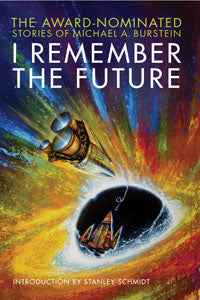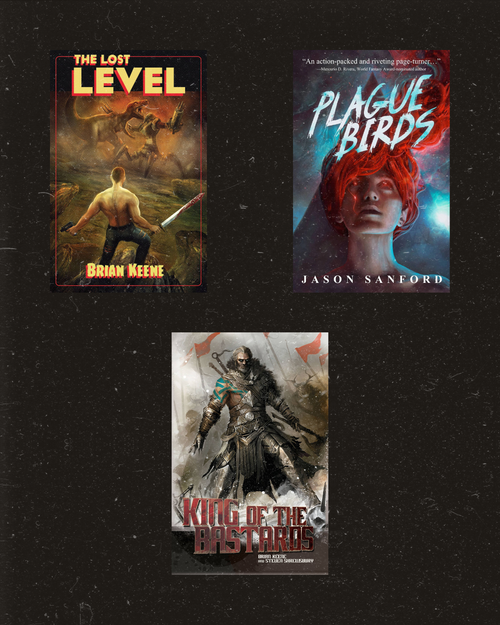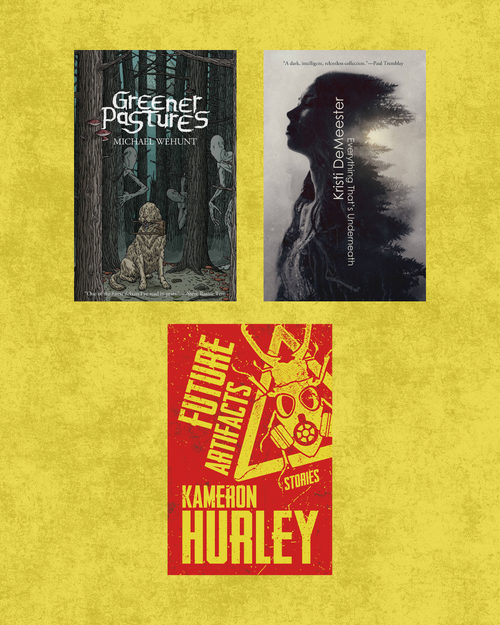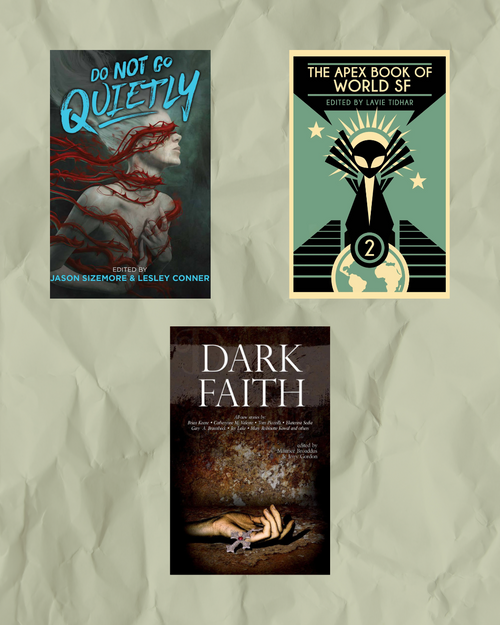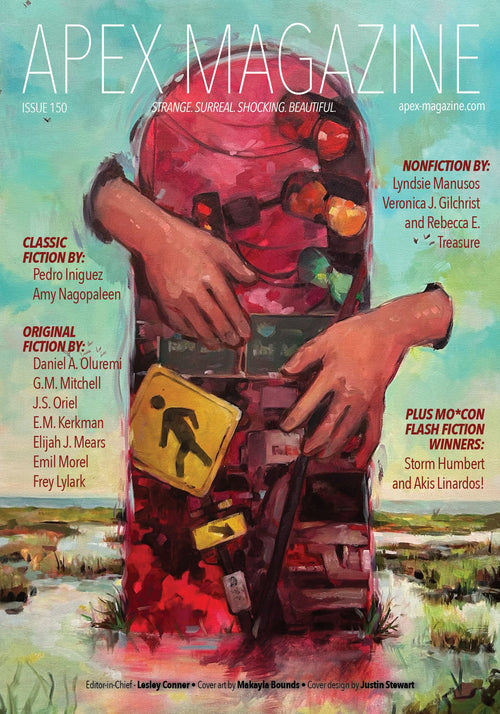Kaddish for the Last Survivor
Michael A. Burstein
“The deniers’ window of opportunity will be enhanced in years to come. The public, particularly the uneducated public, will be increasingly susceptible to Holocaust denial as survivors die… Future generations will not hear the story from people who can say ‘this is what happened to me. This is my story.’ For them it will be part of the distant past and, consequently, more susceptible to revision and denial.”
—Deborah Lipstadt, Denying the Holocaust, (1994)
SARAH JACOBSON’S HANDS SHOOK AS she parked her clunky Volkswagen across the street from the old suburban house in which she had grown up. She sat there, breathing in the gas fumes from the idling engine as she watched the reporters swarm all over the front lawn.
Her boyfriend, Tom Holloway, sat next to her in the passenger seat. He stared at her for a moment, then asked, “Ready?”
Sarah nodded. As she turned off the car’s engine, Tom jumped out of the front seat, dashed around the front of the car, and opened the driver’s side door for her. For once, she was grateful for the old-fashioned Southern charm. To think, when she’d first met him, she’d resented it.
Well, she didn’t resent it now. Tom was positioning himself to fend off the horde of reporters, and she was grateful for that, too. Fortunately, no one had noticed, or else they had not yet connected Sarah to the biggest news story of the week. Tom gave Sarah his hand, and she allowed him to help her out.
She stretched as she got out of the car, feeling the warmth of the spring sunlight on her back. How strange that she could enjoy it, on this morning of all mornings. She closed her eyes and took a deep breath, listening to a bird singing in the distance.
Tom’s voice intruded upon her brief peace. “Shall we?”
She gave him a small smile. “I guess so.”
“Okay.” Tom looked around, concentrating his gaze on the sea of reporters. “Lot of excitement for a small town on Long Island,” he said. Sarah noticed that he was making no effort to suppress his Southern accent; he knew how endearing she found it. “Hard to believe your grandfather’s attracting all this attention.”
“Yeah,” Sarah replied. “I know.” She cocked an ear toward the reporters. “Listen.”
One radio reporter, close enough to be heard, was speaking into her thumbnail recorder, taping commentary for her story. “This is Paula Dietrich, reporting from Lawrence, Long Island, where Joshua Cohen is dying. Born in Warsaw in the 1920s, Cohen—”
Tom whistled. “He’s become a celebrity. Finally got his fifteen minutes of fame.”
Sarah shrugged. They’d both studied Warhol. After all, they had both graduated from Harvard with honors. “As far as I’m concerned, he’s just my grandfather.”
“Yeah, I know,” Tom said softly. “Sorry. You sure you’re ready?”
“Ready as I’ll ever be, I guess. If I can survive this, I can survive anything.” Sarah grabbed Tom’s hand. They walked off the sidewalk onto the path leading up to the front door. She braced herself for the barrage.
One of the reporters glanced in their direction and recognized Sarah. “It’s the granddaughter!” he yelled and began running toward them. In seconds, all of the shouting, sweating journalists had descended upon Sarah and Tom. The way they jostled at each other, trying to get better positions for recording their images, reminded Sarah of a plague of locusts come to feed.
“We’d like to ask you—”
“May I ask you—”
“I have a question—”
“How do you feel?”
“Did you ever think—”
Tom shouted above the Babel of voices. “Please, everyone! Sarah just wants to get inside.”
Obviously that was not good enough for the reporters. Instead, they used Tom’s interruption to create some semblance of order to their questioning. One reporter took the lead, and the others fell silent.
“Ms. Jacobson, Trevor Hunt, USNA Online. Could you tell us what you’re going through at the moment?”
Sarah glanced at Tom and shrugged. It would be easier to answer a few of their questions first, she decided, and then go inside. She looked directly into Hunt’s right eye, which glowed red with the lens of an implanted camera. “What anyone would go through when her grandfather is dying, I guess.”
“But, Ms. Jacobson!” interjected the radio correspondent they had been listening to earlier. “The circumstances of your grandfather’s position—”
Sarah interrupted her. “Listen. I know what my grandfather is to the world, but to me, he’s just my grandfather. Now let me go say goodbye to him in peace. I promise I’ll talk to you—all of you—later.”
Apparently chastened, the reporters parted in front of Sarah and Tom, clearing the path to the front door. As they walked up the path, a background murmuring began, like cats growling at each other over their food. The reporters chatted with their colleagues or recorded views for their broadcasts. Tom whispered to Sarah, “I’m really surprised. They’re being more courteous than I would have guessed.”
No sooner had Tom said that when a small man stepped right in front of them, blocking their way. He brushed back his sandy blond hair and asked, “Ms. Jacobson, why does your family continue to perpetrate this hoax?”
The growling noises of conversation cut off, leaving nothing but the sounds of the cameras and recorders.
At first Sarah thought he was a private citizen, not a member of the media, as he carried no recording devices and his eyes appeared normal. But a second glance exposed something far more sinister. This man wore a memory recorder implant behind his right ear. His audience, whoever they were, would be able to directly interface with his memories of confronting Sarah, over and over again.
As calmly as she could, Sarah said, “Excuse me?”
The man smiled. “I asked, given the fact that your grandfather, who lived a long and healthy life, is now on his deathbed, why does your family feel the need to perpetuate the hoax of the Holocaust?”
Tom stepped forward, shouting, “Now, listen here, you—”
Sarah gently reached out and grabbed Tom’s shoulder. “Tom, stop.” She turned to the man. “Excuse me, but I didn’t catch your name.”
“Sorry. Maxwell Schwab, from the Institute for Historical Revision. I’m doing an article for our academic journal.” He waved his hand at the other reporters. “We’d like to know why your family has gone to the trouble of inviting the mass media here, pretending to the world that the Holocaust actually happened and that your grandfather was a victim of this fictional event.”
Tom pulled at her arm. “Come on, Sarah, we don’t need to listen to this shi—this crap.”
Sarah resisted. “No, wait.” She pivoted her body to face the reporter. “Mr. Schwab?”
“Yes?”
Sarah slapped him on the face, hard, glad she’d studied self-defense. He staggered back and fell onto his backside. Sarah hoped it was painful enough to keep people from playing this memory.
Schwab sat there, unmoving, just staring at Sarah. No one bothered to pick him up.
She turned to Tom. “Now, let’s go inside.”
No one else stopped them.
* * *
The first thing that hit Sarah as she entered the house was the smell. The odor of stewing meat and potatoes from the kitchen mixed with the old, musty smell that had always been about the house whenever Sarah had returned from college. The living room seemed dark, and it took her a moment to realize that all the shades were drawn, probably to keep the reporters from looking in.
She called out to her parents. “Hello? Dad? Mother?”
Her father called back, “In the kitchen, honey, be right out.”
Sarah turned to Tom. “Are you going to be okay?”
Tom smiled, shrugged, and took Sarah’s hand briefly. “Yeah, I’ve dealt with her before. It’s not too bad.”
“She’s not your mother, though.”
The door to the kitchen swung open. Sarah’s parents, Paul and Anna Jacobson, entered the living room. Her father looked calm, cool, and collected, the way he always looked. He wore a jacket and tie, in stark contrast to the polo shirts and jeans that Tom and she were wearing. Sarah couldn’t remember a time when her father wasn’t dressed so impeccably. Her mother, on the other hand, wore a sweatshirt and sweatpants, as if dressing well was currently her last priority. She appeared frazzled, with her hair all askew.
Tom greeted them with a simple hello. Sarah’s father smiled at Tom, but her mother barely glanced in Tom’s direction.
There was a moment of silence, which her father broke. “Come, Tom, I need your help in the kitchen. You can tell me how your family’s doing back in Durham. And how about those Mets?”
The two men went through the slow swinging door, which creaked loudly until it finally shut, muffling their awkward conversation about baseball. Sarah and her mother watched the door for a few seconds after it had closed, and then Sarah turned to look at her mother. “I guess,” Sarah said, “I ought to go upstairs and see Grampa.”
Her mother sniffed. “Sure, go ahead. Do you want to bring your goyische boyfriend upstairs too?”
Damn, Sarah thought, she isn’t going to be reasonable. Surprise, surprise. “Mother, please—”
“And now you’re living with him.”
Shocked, Sarah took a deep breath. “I never told you that! How did you find out?”
Her mother grinned. “Just now, Sarah. You may be my smart Harvard daughter, but you’re not smarter than me.”
Sarah felt furious, but more with herself than with her mother. Anna Jacobson had done it again, pretending to know something so as to trick the information out of Sarah. Damn! How could she have been so stupid? Well, as long as Mother had figured it out, Sarah might as well get everything out in the open.
“I was going to tell you anyway, Mother. Today, in fact. Tom and I are living together. We have been for a while now.”
Her mother glared at her and Sarah said, “I don’t care how you feel about it. And anyway, things are different now.”
“Such defiance,” her mother said, making clucking sounds with her tongue. “And things being different isn’t an excuse.”
“You’re right, Mother,” Sarah said as sarcastically as she could. “An economic depression is no excuse for being unable to afford my own apartment.”
“Now Sarah—”
“‘Now Sarah,’ what?” Sarah slammed the doorframe with her palm. “It’s not like you have the money to help out; you still live here, in the oldest house in the neighborhood. You can’t even afford automatic doors. Well, I can’t afford to live by myself. No one right out of school can, not with our loans. And as it is—” She paused for a moment, then took the plunge. “As it is, Tom and I will probably be getting married soon anyway.”
There. The big secret was out. Sarah studied her mother’s face carefully; it seemed completely shut down. Her mother just stared at her, stonily, not reacting. Finally, Sarah couldn’t take the silence any longer. “Well?” she asked. “Aren’t you going to say something?”
Her mother sighed. “Sarah, it isn’t Tom. He’s a nice boy, and I do like him. But I—and your father—would prefer that you marry someone Jewish.”
“Why?”
“Why? What do you mean, why?”
“Exactly what I said, Mother.” She spoke crisply, trying to imitate the Cambridge accent of some of her professors. “Why?”
Her mother looked over Sarah’s shoulder. Was it possible she had never really considered this question before? After a few seconds, Sarah’s impatience got the better of her again. “Is it because of Grampa? Because he’s the last one?”
Her mother immediately replied, “No! It’s because you’re Jewish. And it surprises me you’d even think of marrying someone who isn’t.”
Sarah shook her head and sighed. “You know, Mother, you shouldn’t be so surprised. You never raised me as Jewish.”
Her mother’s eyes, filled with shame and fear, locked onto Sarah’s. “That’s not true,” she said softly.
Sarah nodded and went back to being sarcastic. “Yeah, Mother. Matzoh ball soup on Passover, and Chinese food and a movie on Christmas. Should have been enough for me, right? That didn’t make me Jewish; it just made me a different type of American. And that’s how you and Dad raised me, as an American.”
Her mother stood still for a moment, then sank onto one of the cushioned chairs. It sighed, sending dust into the air. “I can’t believe it,” she said, shaking her head. “I’m doing what I said I never would.”
Confused, Sarah asked, “What are you talking about?”
Her mother seemed to go through an internal struggle, and when she spoke next, her words were chosen with care. “Sarah, I guess you were right, in a way. It is because of Grampa that I want you to marry someone Jewish, but it’s also because of Grampa that I never really made that clear. Because…because I wanted to protect you.”
“Protect me?” Sarah felt surprised; the only things her mother had ever tried to protect her from were strangers and bad grades.
“Yes, Sarah, protect you. I mean, just look outside at that mob of reporters. You don’t know what it’s like growing up as the only child of a survivor. I had to grow up listening to all these stories over and over, all this pressure on me from your grandfather. Because of the Holocaust. All that pressure you’re feeling from me—I felt it from him. He’s dying now, and I still feel it.” Her voice trembled, but she clamped her mouth shut.
“Because of the Holocaust? Mother, Grampa was never very religious; you told me that yourself. And I don’t see how the Holocaust is a reason to marry someone Jewish.”
“Why not?” she asked softly.
Sarah considered the question. “I know something of our religion,” she said without conviction. Somehow, that was the one thing she had never gotten around to studying while at Harvard. “The Holocaust is not exactly a…a defining event in Judaism.”
Her mother shook her head. “Oh, yes it is. After all, Sarah, by intermarrying, aren’t you denying what it is about you that made the Nazis try to wipe us out? Some would say that you’re letting Hitler win. After all these years.”
Sarah didn’t know what to say to that; it made her angry and upset, and choked her up. But her mother continued. “Sarah, these were all the things I had to grow up with from your grandfather. I don’t know what it was like firsthand to be in the camps, thank God, and God forbid that anyone ever will again. But to your grandfather, his experience there was always more real than the rest of his life. More real than the people in his life.”
Her mother paused for a moment, then said, “It was even more real to him than I was.”
“Oh,” Sarah finally managed to say.
“Your grandfather felt that every minute of life had to be devoted to reminding the world. Except instead of bothering the world, he bothered your grandmother and me. When you were born, I promised myself that I wouldn’t let him warp your life the way he warped mine.”
“But your life isn’t—” Sarah cut herself off.
Her mother chuckled bitterly. “It isn’t warped? Sarah, compare your life to mine; you’ve always had more choices than I did. In my day, there was still so much women couldn’t do, or wouldn’t be allowed to do. Things were good for a while, but then when the Supreme Court overturned Roe v. Wade, it was like the clock turned backwards for all women. And for a Jewish woman, the only daughter of a survivor—” She stopped.
“Yes, Mother?”
“Let’s just say that your father was not the first man I wanted to marry. But your grandfather, well…”
There was nothing Sarah could think of in reply, and her mother gave her a sad smile. “Now, maybe, you understand,” she whispered.
“And maybe you do too,” Sarah whispered back, a question and a statement at the same time.
Mother and daughter regarded each other for a moment, and then Sarah spoke. “I’m going upstairs to see Grampa, Mother. It’s my last chance.”
Her mother sighed. “Go. I’ve already made my peace with him. We’ll talk more later, after—when there isn’t so little time.”
* * *
Grampa looked so weak lying in the hospital bed that U.S. Hospice had provided. Where was the strong man of Sarah’s childhood, the Grampa who had carried her on his shoulders at the playground, who had comforted her on her first frightening day of school, who had attended her high school graduation just five years ago? This old, frail shell of a man, lying in bed with blankets around his thin body and snoring weakly—Sarah couldn’t reconcile him with her memories of her grandfather.
Then, tattooed upon his left arm, she saw the number: 110290. It had always been there. She remembered that first time she had asked Grampa about it. She’d been six years old. He had taken her to the playground near the house, on a hot summer day. Grampa took off the raincoat he always wore, sat on a bench with other old people, and let Sarah run off and play while he “snoozed and schmoozed,” as he liked to call it. She never understood how he could sleep with all the noise from all the children playing, but Grampa seemed able to sleep anywhere. It might have scared her, but he always woke up when she called him.
When she returned, she was shocked to see that Grampa had rolled up his sleeves because of the heat. Grampa never rolled up his sleeves.
“Grampa,” Sarah had asked, “what’s that?” Her little fingers reached out to touch the number.
He woke instantly. “What is what?”
“That number. What is it?”
Grampa saw what she was looking at and quickly rolled down his sleeve. “Better you shouldn’t ask,” he said, and glared at her. Then his face softened. “Saraleh, how old are you again?”
She laughed. “Six, silly!”
“Six.” He looked into the distance for a moment. “I had a sister who was six, once. She never got to be seven.”
Grampa had had a sister? Sarah had never heard of this before. “What was her name?”
“Sarah. You were named for her.” He looked at his left arm and rolled the sleeve back up, displaying the tattoo. “I was sixteen; that was when I got the number. Sarah, forget what I said before. It is better that you ask. You must ask. And remember.”
He had told her of the horrors of the camp. Of how his own grandfather had disappeared one night. Of how he, his parents, and his little sister were taken away in cattle cars from their home to a place called Auschwitz, where they were separated, and how he never saw them again. Of how he had very little to eat, all of it bad. Of how he had to endure the beatings of the guards. Of how he got sick with typhus and thought that he would be sent to the gas chambers and turned into smoke and ash. Of how they marched him to Buchenwald, and how he almost collapsed and died along the way. Of how he was barely able to move when the Americans came to liberate them, and how two righteous gentiles whose names had sounded Jewish, Sergeant Rosenthal and Corporal Glaub, had attended to him and nursed him back to health.
His stories had seemed so incongruous in the bright, sunny playground filled with the laughter of little children, and at first Sarah thought he was making them up. But as the stories continued and got more horrible, Sarah became mesmerized. When he finished, Grampa had tears in his eyes. She hugged him, and he trembled just like Sarah did when she woke up from a nightmare.
That night, so many years ago, the rain had pounded on Sarah’s bedroom window like gunshots. It was a hot, humid night, and as Sarah drifted off to sleep she thought of all her grandfather had told her. She dreamed of being stuffed into a gas chamber, the stink and sweat of human flesh pressing on her from all sides, Nazi stormtroopers shooting people outside, human flesh burning, going up in sweet-smelling smoke—
And she awoke, screaming and crying. Her mother had come in and held her for a long time. When she found out about Sarah’s dreams, she promised Sarah that she would never have such dreams again. From that day on, Grampa never took Sarah to the playground alone. And the nightmares had faded away and disappeared, except for the memory of the number on Grampa’s arm: 110290.
Sarah shook her head, clearing away the memories of that long ago night, and looked at the bed. The frail old man wrapped in blankets had that same number, 110290, tattooed on his arm. There was no question in Sarah’s mind now that this man was her grandfather, lying in his bed.
And dying.
I shouldn’t disturb him, Sarah thought, and had turned around to leave the room when she heard his voice. “Who’s there?” Even when he was dying, he woke to the sound of her.
She turned back; her grandfather’s eyes were open. “It’s Sarah, Grampa.”
He smiled. “Saraleh, it’s good to see you.” He struggled to sit up in bed, and coughed. “Here, come sit next to me, on the bed. We’ll have one last chance to snooze and schmooze before I go.”
“Grampa! Don’t talk like that.” She moved his blankets over and sat down.
“Sarah, Sarah. Years ago, it would have been tempting the evil eye to say such things, but now…now I am dying. And I am looking forward to peace. I have not had a peaceful life, mameleh.”
“I know.”
“So nu. Tell me, how are things? What are you doing with yourself?”
Sarah shifted around. “Well, I’m living in New York City now, you know. I’m working for a web publisher. Editing.”
“And are you enjoying it?”
“I suppose, although what I’d really like to do is write.”
“Eh. And are you seeing anyone? I want great-grandchildren, you know.”
He laughed, and Sarah joined in. “You remember Tom, don’t you? We’re living—I mean, he’s now at NYU, in law school.”
Grampa fixed Sarah with a long gaze. “So, you’re living together?”
Sarah blushed. “Yes. Um, I tried to keep it a secret. I’m sorry.”
“What is there to be sorry about?”
“Well, it’s just…”
“It’s okay, Saraleh. I understand your generation. It is not that much different from mine.”
“But you don’t approve of Tom, do you?”
Grampa sighed. “Tom’s a good boy, a fine young man. I would have preferred if you had met someone Jewish, but I can’t fault you for your choice. He will make a good husband.”
Sarah thought for a moment. “Grampa, can I ask you something?”
“Anything, mameleh. But you’d better hurry.” They both smiled at that. Sarah blinked hard to stop the tears.
“Why is it so important to you that I marry someone Jewish? It’s not like you were ever religious or observant.”
Grampa closed his eyes and took a deep breath. “You ask such a difficult question, like the simple child’s question about the Passover seder. It’s true, I never was observant, not before the camp or after. But, Sarah, because of where I was—Auschwitz—your children have to remember, they have to know what they are and understand where they came from. I need them to be Jewish, and not just because you are. They have to know that they are Jewish.”
“But why?”
He sighed. “Because if they do not realize who they are, they will be the first to go to the gas chambers the next time there is a Holocaust.”
Sarah was shocked. “Grampa, you can’t seriously believe that it could happen again. The Holocaust is a distant memory from the last century. Even if it did happen—”
“If it happens…when it happens, God forbid, again, the first Jews to die will be the ones who don’t realize they are Jewish. The German Jews saw what Hitler was doing. They were Germans, they said, not Jews. What Hitler is doing doesn’t apply to us. They never believed it would…until it was too late.”
“But it couldn’t happen again. Could it?”
Grampa was silent for a moment. “Sarah, your generation grew up in a world that felt much safer than mine. We made it that way. Maybe it really wasn’t so safe, maybe we weren’t so bright, but your parents and I certainly tried to protect you from the world outside. Maybe we succeeded too well.
“It is because you feel so safe, and because the Holocaust is so distant, that your generation is in danger. People are forgetting. The Holocaust Museum in Washington lost its funding and is gone now, after only thirty years, because no one thought it was important anymore. Auschwitz—Auschwitz is now a side attraction for people going to the VR mall across the way.” Straining, he bent his head over and spit on the floor. “There are even people who claim the Holocaust never happened in the first place, people who are being taken far too seriously.”
“I know what you mean. Just outside—” Sarah bit her lip.
But it was too late. “What? What happened outside?”
Sarah shrugged. “A reporter. He—he accused us of making it all up.”
Grampa frowned, his voice bitter. “Always,” he said. “Always the big lie. Well, they wouldn’t let me live in peace. Why should I expect then to let me die in peace?”
“It was only one, Grampa,” Sarah said dismissively. “The other reporters are—I mean, they know it’s for real.”
“Even one person denying the truth is one person too many.” He sighed. “The deniers are everywhere, Sarah. They started when I was just out of the camps, telling me that the horrible things I had seen with my own eyes never existed. Telling me I was crazy. But there were always enough of us around, to educate, to lecture, to write, to bear witness for the world. But now—”
He coughed, loud, long, and hard. Sarah stood up. “Grampa, you must rest. You’re letting yourself get all worked up. I’ll go get you some water.”
He shook his head and waved for her to sit back down again. “Please, Sarah, wait. I don’t have much time, and this is far too important.”
She sat down again. “Yes, Grampa, what is it?”
“Sarah, you must promise me. After I am gone, there will be no one to bear witness. I am the last of the survivors. You must bear witness for me—for all of us, the six million who died and those who survived to tell the world.” He took her left hand in a grip that was surprisingly strong.
Now the tears welled up in her eyes, past her strength to hold them back. She began to weep. “Yes, Grampa, I will.”
Tears blurred her sight, and Sarah wiped them away. As her vision cleared, she noticed Grampa staring directly into her eyes.
“Sarah, listen carefully. I want you to open that drawer over there.” With his right hand, Grampa pointed to the top drawer of the bureau. Sarah let go of his left hand, dutifully walked over to the bureau, and pulled the drawer open. It contained only one item, a small, shiny metal box with the logo MEMVOX printed across the side. She pulled it out and turned it around, studying it.
“My God, Grampa,” she said. “Is this what I think it is?”
He nodded. “A memory recorder. The chip is inside.”
Sarah hesitated before asking her next question. She feared she already knew the answer. “Grampa…what’s on it?”
He coughed. “Me. When I am gone, I want you to play it.”
Sarah now understood what Grampa had meant about her bearing witness. She shook her head. “I can’t do this, Grampa.”
“You will do the right thing, I am sure of it. Sarah, you must. You’re young, you’re strong, you can handle it. When you play that chip, you will be the last survivor.” He coughed. “Zachor. Remember. Bear witness, from generation to generation.” He turned away from her and began to recite the Jewish affirmation in the existence of God, “Sh’ma Yisroel…” His voice trailed off. His breath faded. Then it ceased entirely.
Sarah wiped the tears from her eyes. She stood up, then covered her grandfather’s face with the blanket. She finished reciting the Sh’ma for her grandfather in English; she hadn’t realized that she remembered: Hear, O Israel, the Lord is God, the Lord is One. She turned off the light and left, closing the door silently behind her.
* * *
That night, Sarah sat alone in the bedroom of the two-room Manhattan apartment she shared with Tom. She had asked Tom for some privacy, and he had readily agreed; so he was in their living room, watching TV or logged onto the Internet, Sarah wasn’t sure. Tom had assumed that the stress of the quick late afternoon funeral and burial was what had prompted Sarah to ask for some time to herself, and she had chosen not to correct him. She was glad that Jewish tradition held that a funeral and burial should take place as soon as possible after death; she had a lot to think about and didn’t want to have to worry about seeing her mother again so soon after Grampa’s death.
On the small night table in front of her sat the memory recorder and the chip. She picked up the chip and turned it over and over in her hands. Grampa had labeled it in black ink with his name and date of birth. Sarah had written in today’s date at the bottom of the label, in blue ink, but that was all she had done so far. Tom had given her the privacy she requested over half an hour ago and Sarah still wasn’t sure what to do.
A wastebasket sat next to their second-hand full-size bed. Sarah could just drop the chip into it and never think of it again. Or she could take it to a recycling center and get some small amount of money for it. As for the memory recorder, although used, it was valuable, and could easily pay the rent for the next few months.
But that would almost be like desecrating her grandfather’s grave. Grampa had given her the recorder and the chip for a reason. He wanted her to play it, to share those experiences with her. She thought about those experiences, the stories he had told her about the Holocaust when she was six years old, and she realized that she would never want to live through it herself, even vicariously through someone else’s memories. She held the chip above the wastebasket, ready to let it fall—
—And then she remembered the reporter from that morning.
She had to fulfill her promise; her grandfather had depended on it. Quickly, so she would not be tempted into changing her mind again, she inserted the chip into the recorder, attached the wires to her head, and hit PLAY.
An hour later, when the chip had finished playing, she slowly removed the wires. She shuddered and began to cry, but softly, so as not to alert Tom. She removed the chip from the recorder and stored it safely away. The memories from her grandfather’s Holocaust experiences precipitated in her a decision, a choice; she just hoped that Tom would understand. She knew that she would have to find someone knowledgeable about computers and recorders, someone sympathetic to her position who could hack the Internet and force Grampa’s memory records to be played by anyone plugging in, at least for a short while. Sarah would come forward and take responsibility, once she was assured that no one would ever take the revisionists seriously again. But…if she went forward with this plan, to bear witness for her grandfather, there was one other step she needed to take first.
* * *
Sarah walked into the tiny store, a remnant of the old Times Square, struggling against the gentrification of the past thirty years. Most places of this sort had moved to the outer boroughs of Queens and Brooklyn, but this one was still there. The sign above the glass bore the one word, ADULT, in large black letters, and hanging in the window Sarah could see signs promising things like fake ID chips and real tobacco cigarettes.
She strode in purposefully, ignored the grime of the floor and shelves, and walked through to the room in the back, where the guy she was looking for worked. The room was small, empty at the moment except for the artist, who was reading a newstape as she entered. His appearance repulsed her, as he had rings through his nose, ears, and eyebrows, and he also sported tattoos on his arms and face. She would never see a person like this socially, but she was here for something else. The guy looked up at her inquisitively as she approached.
“Hello,” she said. “I’d—I’d like to get a tattoo. Can you tattoo a number?”
“Sure,” he said, putting down the newstape. “I can do anything.”
“Good.” Sarah sat on the long chair meant for his clients and rolled up the sleeve of her left arm. “I want you to tattoo the number 110290 right here.”
The man looked askance at her. “Like a Holocaust victim?”
Sarah nodded, pleased that the guy recognized what she wanted. She would still go through with her plan, but for the first time since her grandfather had died, she thought that perhaps there was still hope for the world to remember its history after all. “Yes,” she said. “Exactly like that.”







